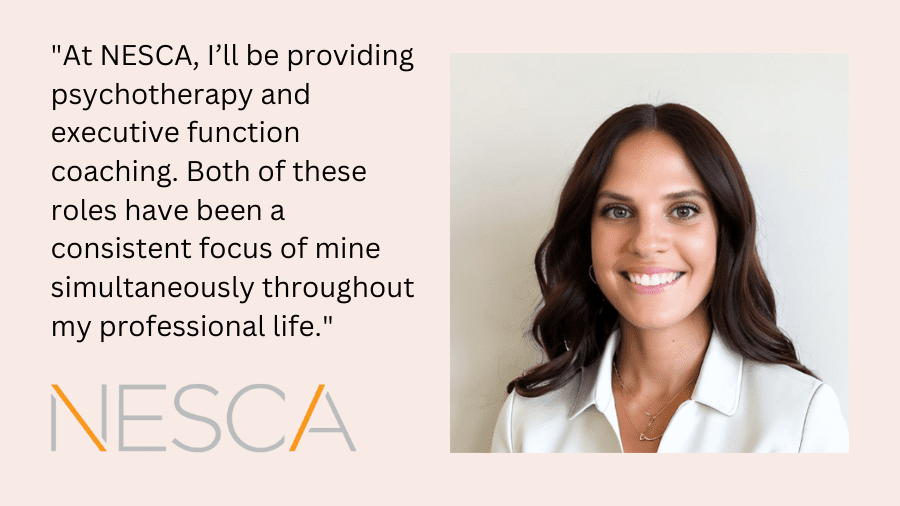
 By Angela Currie, Ph.D.
By Angela Currie, Ph.D.
Pediatric Neuropsychologist; NH Director, NESCA
For three days every July, students, clinicians, and researchers from around the country descend upon Milwaukee for Marquette University’s Neuroanatomical Dissection Course. This Marquette course is the only one in the world that provides a continuing education opportunity to learn about advances in neuroscience research while also engaging in hands-on brain dissection within the university’s gross anatomy lab. This past July, my NESCA colleague, Dr. Erin Gibbons, and I had the pleasure of being two of the participants.
Perhaps not unexpectedly, the lab components of the course were insightful and impactful. This included watching 3-D computer-aided brain maps within the visualization lab at the engineering school, as well as hands-on brain dissection of donor specimens, some of which presented with unique pathologies that had never been seen first-hand within the lab. Across the three days of the seminar, lectures covered a range of topics, such as neuroanatomy, how emotions function in the brain, and functional and neurological presentation of brain pathology. We also had the opportunity to select from a range of presentations that provided a “deep dive” into more specific topics. There was a host of information that directly speaks to our practice as pediatric neuropsychologists. That said, as someone who often works with clients who face depression, anxiety, and trauma, certain information stood out as most relevant to my daily practice.
First, there is an increasing amount of research indicating that early-onset (onset in childhood or adolescence), prolonged depression can significantly reduce the growth and volume of particular brain areas related to learning and memory; however, this negative impact can be ameliorated with antidepressant medication.1,2 Often times, when working with clients, families are understandably reticent about giving medication to their developing child. While individual response to treatment cannot be predicted, this research shows that, when appropriate to the client’s needs, medication can actually protect brain development, and thereby better support learning and memory over the lifespan.
Another topic that was covered was the impact of trauma on brain development and later self-regulation challenges and treatment response. As a clinician who often sees children with developmental, complex trauma, I am often in the position of explaining to families how trauma affects brain development. There is research to suggest that ongoing adversity early in childhood inhibits development in areas of the brain that manage inhibition, emotions, and processing, and this may contribute to later difficulties understanding emotion and modulating stress.3 While trauma may affect brain development in any child, there are also some children who appear to persist through adversity with lesser effect. There is research to suggest that this “resiliency” may not just be a personality characteristic, but may be a result of a larger, better-developed area of the brain that is thought to integrate emotional and cognitive information, allowing them to better manage emotional responses.4 Stronger development in this area can also predict better response to cognitive behavior therapy in older individuals with PTSD. 5 While it is not always clear what allowed those individuals to have stronger brain development, research shows that early treatment and access to social supports results in improved emotion processing and brain function in children with trauma, emphasizing neuroplasticity within the brain.6,7
The message that can be extracted from the above research is that the brain is highly vulnerable, but it can also be very resilient and adaptable. While our experiences and genetic vulnerabilities may present their challenges to neurological development, proper therapies, social supports, and medications can change a person’s developmental course and support long-term gains. Actually measuring brain volume and conducting imaging is not necessary for understanding how these factors present within an individual person. Instead, comprehensive assessment of their neurocognitive functioning, processing, learning, and social/emotional functioning can elucidate their resiliency factors, as well as targets for intervention. This is what we have always strived to do at NESCA, and now with the advantage of the Marquette Neuroanatomical Dissection Course, we can demonstrate how our clinical process, values, and goals are supported by current brain research.
References
- Schmaal, L., Veltman, D., van Erp, T. et al.(2016). Subcortical brain alterations in major depressive disorder: findings from the ENIGMA Major Depressive Disorder working group. Molecular Psychiatry, 21: 806–812. https://doi.org/10.1038/mp.2015.69
- Sheline YI, Gado MH, Kraemer HC. (2003). Untreated depression and hippocampal volume loss. American Journal of Psychiatry,160(8):1516-1518. doi: 10.1176/appi.ajp.160.8.1516.
- Zhai ZW, Yip SW, Lacadie CM, Sinha R, Mayes LC, Potenza MN. (2019). Childhood trauma moderates inhibitory control and anterior cingulate cortex activation during stress. Neuroimage, 185:111-118. doi: 10.1016/j.neuroimage.2018.10.049.
- Stevens, JS, Ely, E.D., Sawamura, T., et al. (2013). Childhood maltreatment predicts inhibition-related activity in the rostral anterior cingulate in PTSD, but not trauma-exposed control. Depression and Anxiety, 33(7): 614-622. https://doi.org/10.1002/da.22506
- Bryant RA, Felmingham K, Whitford TJ, et al. (2008). Rostral anterior cingulate volume predicts treatment response to cognitive-behavioural therapy for posttraumatic stress disorder. Journal of Psychiatry and Neuroscience, 2008, 33(2):142-6. PMID: 18330460.
- Wymbs, NF, Orr, C, Albaugh, MD, et al. (2020). Social supports moderate the effects of child adversity on neural correlates of threat processing. Child Abuse & Neglect, 102: 104413. https://doi.org/10.1016/j.chiabu.2020.104413.
- Garrett A, Cohen JA, Zack S, C, et al. (2019). Longitudinal changes in brain function associated with symptom improvement in youth with PTSD. Journal of Psychiatric Research,114:161-169. doi: 10.1016/j.jpsychires.2019.04.021.
About the Author
To book an evaluation with Dr. Currie or one of our many other expert neuropsychologists, complete NESCA’s online intake form. Indicate whether you are seeking an “evaluation” or “consultation” and your preferred clinician in the referral line.
NESCA is a pediatric neuropsychology practice and integrative treatment center with offices in Newton, Plainville, and Hingham (coming soon), Massachusetts; Londonderry, New Hampshire; and the greater Burlington, Vermont region, serving clients from infancy through young adulthood and their families. For more information, please email info@nesca-newton.com or call 617-658-9800.





 delays, learning disabilities, attention difficulties and executive functioning challenges. She often works with children whose complex profiles are not easily captured by a single label or diagnosis. She particularly enjoys working with young children and helping parents through their “first touch” with mental health care or developmental concerns.
delays, learning disabilities, attention difficulties and executive functioning challenges. She often works with children whose complex profiles are not easily captured by a single label or diagnosis. She particularly enjoys working with young children and helping parents through their “first touch” with mental health care or developmental concerns.
 unique pattern of strengths and weaknesses to best formulate a plan for intervention and success. With experiences providing therapy and assessments, Dr. Creedon bridges the gap between testing data and therapeutic services to develop a clear roadmap for change and deeper of understanding of individual needs.
unique pattern of strengths and weaknesses to best formulate a plan for intervention and success. With experiences providing therapy and assessments, Dr. Creedon bridges the gap between testing data and therapeutic services to develop a clear roadmap for change and deeper of understanding of individual needs.
 meaningful skills in order to reach their goals. She has spent the majority of her career working in a private school for students with ASD. She has also spent some time working in an inpatient mental health setting. Lyndsay uses occupation-based interventions and strategies to develop life skills, executive functioning, and emotional regulation. While completely her doctoral degree at MGH Institute of Health Professions, Lyndsay worked with the Boston Center for Independent Living to evaluate transition age services. She uses the results from her research to deliver services in a way that is most beneficial for clients. Specifically, she focuses on hands-on, occupation-based learning that is tailored the client’s goals and interests.
meaningful skills in order to reach their goals. She has spent the majority of her career working in a private school for students with ASD. She has also spent some time working in an inpatient mental health setting. Lyndsay uses occupation-based interventions and strategies to develop life skills, executive functioning, and emotional regulation. While completely her doctoral degree at MGH Institute of Health Professions, Lyndsay worked with the Boston Center for Independent Living to evaluate transition age services. She uses the results from her research to deliver services in a way that is most beneficial for clients. Specifically, she focuses on hands-on, occupation-based learning that is tailored the client’s goals and interests.
 By:
By: 
 private practice and schools, she has extensive experience supporting students, families and educational teams to make positive changes. Ms. Edelstein provides executive function coaching and psychotherapy to clients ranging from middle school through adulthood. She also offers consultation to schools and families in order to support her clients across home and community environments.
private practice and schools, she has extensive experience supporting students, families and educational teams to make positive changes. Ms. Edelstein provides executive function coaching and psychotherapy to clients ranging from middle school through adulthood. She also offers consultation to schools and families in order to support her clients across home and community environments.
 research and academia for over 30 years. She is a national consultant and speaker on program design and the inclusion of children and adolescents with special needs, especially those diagnosed with Autism Spectrum Disorder (ASD). Prior to joining NESCA, Ms. Lucci was the Principal of the Partners Program/EDCO Collaborative and previously the Program Director and Director of Consultation at MGH/Aspire for 13 years, where she built child, teen and young adult programs and established the 3-Ss (self-awareness, social competency and stress management) as the programming backbone. She also served as director of the Autism Support Center. Ms. Lucci was previously an elementary classroom teacher, special educator, researcher, school psychologist, college professor and director of public schools, a private special education school and an education collaborative.
research and academia for over 30 years. She is a national consultant and speaker on program design and the inclusion of children and adolescents with special needs, especially those diagnosed with Autism Spectrum Disorder (ASD). Prior to joining NESCA, Ms. Lucci was the Principal of the Partners Program/EDCO Collaborative and previously the Program Director and Director of Consultation at MGH/Aspire for 13 years, where she built child, teen and young adult programs and established the 3-Ss (self-awareness, social competency and stress management) as the programming backbone. She also served as director of the Autism Support Center. Ms. Lucci was previously an elementary classroom teacher, special educator, researcher, school psychologist, college professor and director of public schools, a private special education school and an education collaborative.


Connect with Us